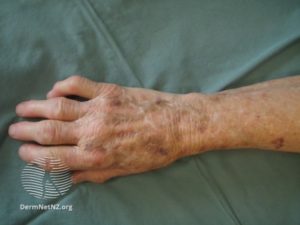Skin Health in Care Homes

ENRICHEnabling Research in Care Homes
GUEST BLOG
Skin Health in Care Homes
Fiona is a registered nurse and researcher. She worked with older people in practice settings for many years. Fiona’s research interests are in older person care and long-term skin conditions. Her expertise is in working with older people, co-creation and knowledge mobilisation, that is, working with health and social care staff and residents to move knowledge across communities to catalyse change. Judith is a registered nurse and health psychologist who works with practitioners and patients to get research into practice to support people getting best care. She is an expert in co-creation and group facilitation and her enthusiasm takes others with her on new journeys to improve lives. Megan is a medical student at the University of Leeds and also works as a carer in a residential home.
In this guest blog Fiona Cowdell, Judith Dyson (Birmingham City University) and Megan Heague (University of Leeds) introduce the first phase of a programme of care home research. Our aim is to work with staff and residents to improve skin hygiene practices and skin health for older people living in care settings.

Fiona and Judith lead the Knowledge- to-Care research cluster at Birmingham City University. We integrate components of six approaches to help staff find efficient and acceptable ways of getting best evidence into day-to-day practice. Our approaches are:
- Co-creation
- Implementation science
- Improvement
- Patient and public involvement and engagement
- Impact
- Knowledge mobilisation
We are aware that huge investment has been made in supporting evidence to practice in the NHS but less attention has been given to this in care home settings. We want to use our expertise to work with care home staff to improve care.`
We want to work with care home staff to improve skin health for care home residents. We need care home staff to complete our survey. It takes about 10 minutes and can be accessed by clicking on this link or pasting it into your browser Care home skin survey
The problems with ageing skin
With age skin becomes more vulnerable to damage. Long term health conditions such as diabetes, reduced mobility, incontinence, some medicines and poor nutrition compound this.

Dry skin and itching affect up to 80% of older people and impact on quality of life and often go untreated. Dry skin increases risk of skin tears and can lead to the development of cracks that allow entry of irritants and allergens which causes itch. Itchy skin leads to scratching which then causes further skin damage that can lead to increased care needs.
How can we reduce these problems?
These problems can be reduced with a simple routine of skin hygiene involving keeping the skin clean and dry using gentle washing and drying techniques using a soap substitute and the regular use of moisturisers. However, some studies suggest this may be a challenge to achieve for nurses and carers across a range of different care environments.
The challenges for nurses and carers in maintaining skin health
There is no published evidence to guide us about what these challenges are or what support nurses and carers need to support older people in their care with skin hygiene. However, when we looked at the challenges to providing other hygiene cares in residential homes (e.g. mouth care) we found these to be wide ranging, for example, knowledge deficits, poor skills, a reluctance to disturb residents, under staffing, a lack of time, finding the care unpleasant to give and an unsupportive work culture.
What we are doing
We are developing a reliable and valid instrument (questionnaire) that quickly allows the measurement and an understanding of the challenges facing nurses and carers in supporting residents in skin hygiene care in any residential care facility. Once this is complete, with our nurse and carer colleagues and older people, we will be able to design strategies that address these challenges and support optimal skin hygiene care preventing skin problems and promoting quality of life in care home residents.
Please join us in our quest
We want to work with care home staff to improve skin health for residents. We need care home staff to complete our survey. It takes about 10 minutes and can be accessed by clicking on this link or pasting it into your browser Care home skin survey
We can also post paper surveys to care home managers with an SAE for return, they just need to email us at fiona.cowdell@bcu.ac.uk